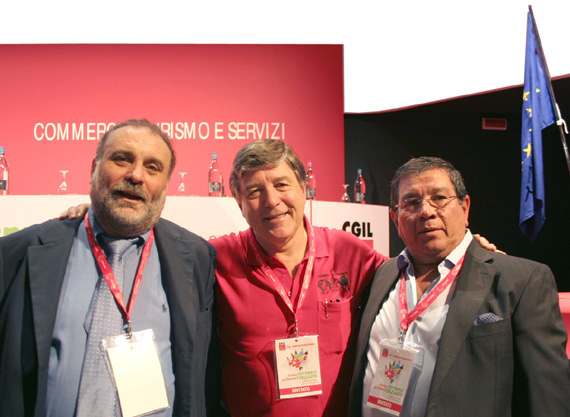|
On 19-21 April 2010, the Italian Federation
of Commerce, Tourism and Services Workers (FILCAMS│CGIL)
held its 13th National Congress
in Riccione, Italy. Participants analyzed
the current situation and looked at the
challenges faced by the sector. FILCAMS,
an IUF
affiliate, is the second largest
organization of the General Italian Workers’
Confederation (CGIL) in terms of membership.
SIREL spoke with Gabriele Guglielmi,
national council member and international
policies coordinator of the Federation, who
gave an overview of the congress.
-What issues were discussed at the congress?
-The
13th Congress of FILCAMS
was held in the framework of the
preparations for the
16th Congress of
CGIL,
with the aim of discussing specific issues
of a sector characterized by a strong
presence of women, seasonal work, widespread
subcontracting and labor flexibilization.
In this sense, the main goal was to identify
solutions to guarantee greater job
stability, ongoing training and a decent
salary during down periods.
Lastly, we examined possible processes to
address the economic crisis, and elected the
new National Governing Council,
formed by 187 delegates, a hundred of which
are women.
-How has the crisis affected the services
sector?
-After the industrial sector, ours is the
second worst hit by the economic crisis, and
we’re working on different fronts to deal
with this situation. The reactivation of the
economy is advancing very slowly and so far
we’ve been able to protect workers through
instruments that are available in
Italy
for guaranteeing salaries in times of
crisis.
But for those workers who don’t have
permanent work contracts, the situation has
become critical.
-How is the situation of workers hired under
outsourcing schemes or affected by
flexibilization?
-On May 1st, we held a joint
Labor Day celebration with the other trade
union confederations in the city of Rosarno.
That city has become a symbol of the
struggle of migrant workers, especially
those from Africa, against criminal
organizations, which promote caporalato
(subcontracting) practices.
In the last few years there has been an
alarming increase in precarious employment,
which very often amounts to slavery, and it
is for that reason that our trade union
confederations are focusing on this very
serious problems.
Last year, for example,
FILCAMS
participated in the “Red
Gold”
initiative, launched by another
IUF
affiliate, the Federation of Agroindustry
Workers (FLAI│CGIL),
to combat slavery conditions in tomato
harvests in the southern Italian
region of Puglia,.
-Several IUF representatives were present at
the congress. How important is the IUF for
FILCAMS?
-There was a significant presence of the
IUF
at our congress: the general secretary,
Ron Oswald;
the president of the International Hotel
Committee,
Norberto Latorre;
and the regional secretary for Latin
America,
Gerardo Iglesias
were there.
FILCAMS
is an affiliate of the IUF and UNI
Global, and we also have bilateral
relations with European, Latin American and
African labor organizations.
For us these relations and contacts are very
important for addressing the challenge of
developing a global strategy to face
transnational corporations together. With
the United Workers’ Federation of
Brazil (CUT), for example, we’re
conducting a project for researching and
exchanging information on good and bad
employment practices in Italy and
Brazil. In this same line of action,
FILCAMS will investigate the conduct of
several companies, such as
Carrefour,
to find out what working conditions and
salaries they’re providing and if workers
are allowed to exercise their labor rights
freely.
The goal is to secure 50 global agreements
with transnational companies in the sectors
in which we operate.
 |